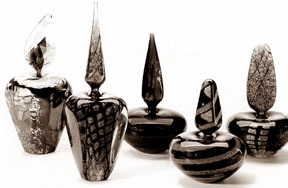|
observer |
|
|
|
|
|
OTHER LINKS |

|

|

|
Point of View:Don't wash, I'm coming home! PerfumesDo you remember the television advertisement which says so vividly, that with generous dabs of perfume all over your body you will easily be making love to the partner of your dreams on a snooker table, listening to the strains of Purple Rain?
In one of the most erotic love poems in the world, the Song of Solomon, the lovers spend the night sampling each other's honey breath and tasting lips perfumed with myrrh. "Thy lips, drop as the honeycomb, and the smell of thy garments is like the smell of Lebanon". Today, however, the herbs, spices and flowers used for their sweet smells by the Ancients have been replaced by aftershave lotions and deodorants. In other words, by artificial aphrodisiacs, which come in glass containers of different sizes, shapes and prices. Some in stylish slim bottles with sliver bands and marble tops. Others in elegant flasks but with narrow necks and gold coloured bands running round the stopper. So exotic, so elegant that sometimes it is the bottle that seems to matter more than the perfume. And they all have appropriate names that evoke passions guaranteed to last till "eternity". But what are perfumes made of? Apparently, formulas used for making perfumes are considered trade secrets, and manufacturers are under no obligation to release them. However, as any graduate in chemistry will tell you perfumes contain harmful chemicals like ethanol, acetone, formaldehyde and benzene, which could cause dizziness, vertigo and skin diseases, as well as cancer and infertility. According to a recent program on Discovery Channel, mountain goats choose their mates by smelling their females. When a pig is in the mood to mate he breathes heavily in the direction of the sow he favours. If she likes him she arches her back and offers herself to him. Its no secret that humans have a very poorly developed sense of smell compared with these animals. Yet, even though our upright position prevents us from adopting the methods adopted by our wild counterparts, don't we also have natural body odours which stimulate desire? Sure we do. The air around us is filled with chemicals called pheromones, made from the Greek words, pherin which means to carry, and horman meaning to excite. The pleasant musky smell of masculine sweat is said to attract women, especially during the middle of their menstrual cycles, when they are at their most fertile. Men, in turn are unconsciously attracted to the isovaleric acid secreted by women which is most powerful during ovulation. Scientists say these secretions are not consciously noted, yet, act as powerful attractants. Undoubtedly then, there is nothing so fragrant and healthy as bodily odours, but in minute concentrations. For, according to anthropologist Louis Leakey, too much odour might become an anti-attractant as it did for our ancestors who owed their survival to the offensive smell of their flesh, which predators found repulsive. But, there is no arguing that there are no superior aphrodisiacs when it comes to pleasing your mate, than those secreted by your own body, in which case its best that you use all the old perfume bottles to collect your own sweat. You could be prepared then, if your partner too sends you a message the way Napoleon did, who, whenever he had time to leave the battlefield wrote to Josephine, saying "Ne te laves pas, je reviens." (Don't wash, I'm coming home.) *** Sense in scentsDid you know that perfume is made of toxic chemicals that can injure your health? Many of the chemicals in perfumes are the same chemicals in cigarette smoke, and yet there is no regulation of the fragrance industry. Many people are "bothered" by perfumes - developing headaches, sinus problems, and even asthma from exposures. Many have gotten sick or even disabled from wearing (or being exposed to) fragrances and using other scented products. And fragrances are now used in almost every cleaning, laundry, and personal-care product on the market! These chemicals go directly into the bloodstream when applied to our skin and are also absorbed into the skin from our clothing. We also inhale the chemical fumes, which then go straight to our brains where they can do major harm. Many even have a "narcotic" effect, which is why some people seem "addicted" to their perfumes. No agency regulates the fragrance industry, yet perfume chemicals can be as damaging to health as tobacco smoke. |
 Perfumes, the belief in the seductive powers of which, is as old as
Cleopatra, are said to be best applied on the body's "hot spots" (the
breasts, neck, earlobes and wrist pulse), according to the Greek poet
Appolonius, who noted more than 2000 years ago, that "perfumes are
sweetest when the scent comes from the wrist".
Perfumes, the belief in the seductive powers of which, is as old as
Cleopatra, are said to be best applied on the body's "hot spots" (the
breasts, neck, earlobes and wrist pulse), according to the Greek poet
Appolonius, who noted more than 2000 years ago, that "perfumes are
sweetest when the scent comes from the wrist". 






